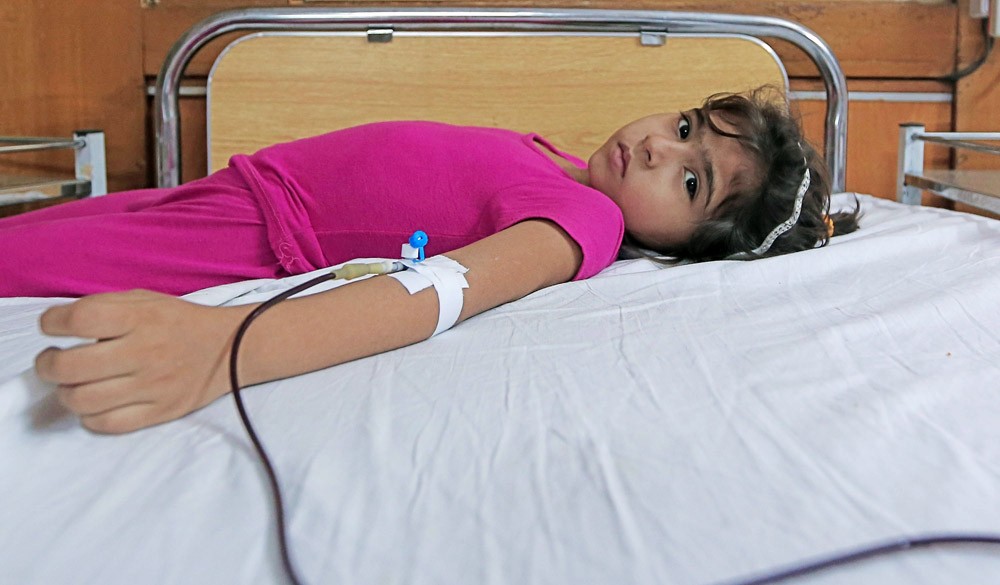
With the news of some thalassemics found to be HIV-positive, the need for safe blood transfusion has resurfaced

The recently-published news about some thalassemia patients found to be HIV-positive, presumably due to unsafe blood transfusion, has shocked many.
The disclosure was made by none other than Prof. Dr. Javaria Mannan, Chairperson Medical Advisory Board, Thalassemia Foundation of Pakistan (TFP). She had shared this information at the 9th National Thalassemia Conference & Workshop held at Fatima Jinnah Medical University in the last week of November.
The news was flashed across front pages of local newspapers, in main bulletins of TV channels and the international media. The federal and provincial governments took immediate notice as the credibility of country’s health system was at stake. Probes were initiated at federal and provincial levels and the inspection committees, heading these probes, declared that they could not find any evidence in support of this claim.
However, they did not give a clean chit to the blood transfusion mechanisms in place and suggested that the Punjab government should perform laboratory tests of the 10,000 registered thalassemic children getting treatment in public and private health facilities in the province.
This, the committee members said, was essential to find out if any of them was HIV positive.
Dr Mannan had also talked to the participants about the high incidence of hepatitis B and C in transfusion-dependent thalassemics in the country. She had pointed out that up to 80 per cent of these patients were hepatitis B or C positive. But this, equally shocking claim, was not taken as seriously as the one about HIV prevalence. Her point was that as the blood synthesis of thalassemia patients stops due to blood disorder and blood transfusion is needed fortnightly for their survival, the probability of them contracting a disease due to blood transfusion is quite high.
TFP spokesman Sharafat Ali tells TNS that they cannot say anything at the moment as Dr Javeria is out of country. Once she returns, she will give the details the media is looking for. However, he clarifies that she had spoken generally about the prevalence of these diseases in the country, spread mainly due to unsafe blood transfusion methods in practice, and not identified any particular patients.
TFP, he adds, is working on guidelines regarding safe blood transfusion practices and these will be shared with the public soon.
There are many who insist the claim of a responsible office-bearer of this organisation should not be brushed aside so easily. For example, a senior doctor with expertise in thalassemia treatment says on condition of anonymity that though it was the statement of a single person it was given from the platform of the organisation and backed by all the office-bearers. "Now they disown it. Why didn’t they deny it there and then?"
He says the probe teams are asking them to identify the patients who were found HIV positive. This, he adds, is against medical ethics, as their identification will make them highly stigmatised. What the government shall focus on is that all the public sector and private sector blood banks are made to follow all the mandatory requirements under the national blood (transfusion) policy, he suggests.
Dr Arif Tabassum, Additional Director, Institute of Blood Transfusion, Lahore, Punjab, says the different inspection committees have carried out probes but not found any evidence that supports this claim. He adds he was also part of an inquiry committee that inspected the records of blood banks associated with teaching hospitals and district and tehsil headquarters. Dr Tabassum adds maybe the patients pointed out by Dr Javeria are being treated at her private clinic and she can give the details once she returns.
He says no doubt the chances of thalassemics contracting diseases through blood transfusion are high as many get blood from substandard blood banks and health facilities. For example, he says, the people living in villages and far-flung areas find it hard to visit big cities every fortnight to get blood transfusion. Their mobility is affected badly in case of rains, road blockades due to construction or for any other reason.
Dr Tabassum says they have suggested the government to set up thalassemia centres at DHQ level so that patients living in the catchment areas could benefit from them. These patients can be tracked for follow-up treatments, he adds.
These suggestions come at a time when there are comprehensive guidelines in place though implementation is still a concern. The National Blood Policy and Strategic Framework 2014-20 states that "the role of the private non-profit sector in blood transfusion has increased over the past few decades largely as a result of increase in the demand of transfusion driven to a large extent by the huge burden of thalassemia disease in the country."
The document adds that the total number of blood centres in the country is estimated to be 1,830 with a major contribution by the private/NGO sector. It also takes into account the devolution and decentralisation issues surfacing as a result of the recent 18th constitutional amendment.
Besides, the policy provides a strategic framework and directions for blood transfusion services including that of blood screening and blood products for five Transfusion Transmissible Diseases (HCV, HBV, HIV, Syphilis and Malaria).
The lack of public interest in voluntary blood donations is also a cause why people have to buy blood in desperation and get treated at substandard facilities. This has been corroborated by the data collected in 2011 from 324 blood banks in Pakistan for WHO Global Database on Blood Safety. It was found that there were only 15.4 per cent voluntary non-remunerated blood donations while 84.6 per cent were replacement/family donations. Replacement donations are those in which relatives or friends of patients donate their blood to the blood bank and get it exchanged with the blood belonging to specific group that they require at the moment.